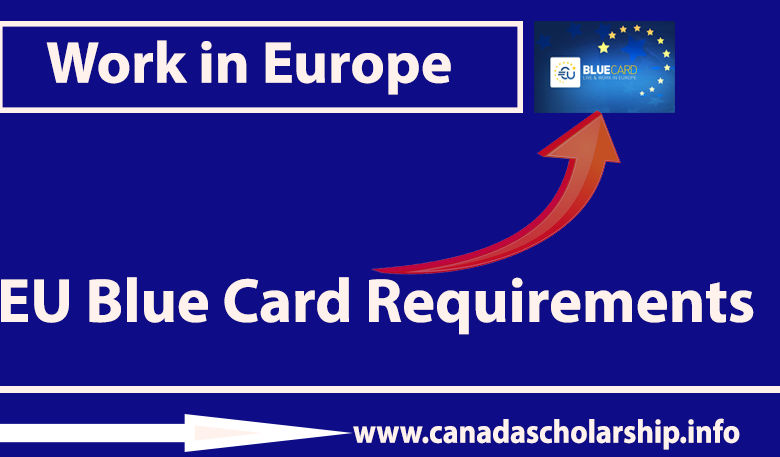
EU Blue Card Requirements to Work in Europe for 2023 – Easy Step
- Knowledge is power
- The Future Of Possible
- Hibs and Ross County fans on final
- Tip of the day: That man again
- Hibs and Ross County fans on final
- Spieth in danger of missing cut
If you want to work in Europe in 2023, this guide is your key. It provides a comprehensive overview of the EU Blue Card requirements and a step-by-step guide on how to fulfill them. The EU Blue Card is a great opportunity for non-EU nationals to work in an EU country. It is a residence permit approved by the European Commission that allows applicants to enter and remain in a specific country for employment. Thus facilitating them with the opportunity to build their future prospects in Europe.
By obtaining an EU Blue Card, you are empowered to legally work in an EU nation and can also travel back home anytime you want to meet your family. This Card grants you and your family members the convenience of mobility across the EU. Furthermore, you’ll be granted the same rights and entitlements as other native Europeans. If you’re looking for information on the EU Blue Card, look no further – this post covers everything from eligibility and requirements so you know exactly what to expect. The Blue Card is analogous to the Green Card in the US and Canada’s Express Entry program, making it a great option for those seeking a European work permit.
Qualifications and Skills:
Educational qualifications play a significant duty in fulfilling the needs for the EU Blue Card. Right here’s a rundown of the discussion on the topic:
Bachelor’s Degree or Higher:
- Clarify that a bachelor’s degree or higher is generally needed for the EU Blue Card.
- Stress that the degree ought to be from a recognized establishment, either in the candidate’s house nation or internationally.
- Review the significance of the degree pertaining to the job setting provided in an EU member state.
Recognized Institutions:
- Describe that recognized organizations refer to approved universities or educational institutions that fulfill specific quality criteria.
- Highlight that the acknowledgment of an institution may vary amongst EU participant states.
- Motivate candidates to confirm the recognition condition of their educational institution before applying for the EU Blue Card.
Equivalency Assessments:
- Go over the opportunity of having levels from non-European organizations examined for equivalency.
- Clarify that similarity analyses are conducted to determine if the applicant’s degree fulfills the academic demands of the EU Blue Card.
- Mention that some EU member states might need applicants with non-European degrees to go through the equivalency assessment procedure.
Relevance to Job Position:
Highlight the value of the applicant’s instructional history aligning with the task setting offered.
Describe that the work placement must generally need the skills and also knowledge obtained with the candidate’s educational qualifications.
Go over just how the significance of the level to the task placement might be examined during the EU Blue Card application process.
Alternative Qualifications:
- A reference that in many cases, pertinent work experience or professional qualifications may be thought about as options to a formal level.
- Go over just how alternative certifications are examined and acknowledged by the particular EU participant states.
- Keep in mind that specific demands may differ among countries, and it is crucial to inspect the qualification standards of the target country for the EU Blue Card.
Specialized Professions:
Highlight that particular occupations, such as medical physicians, designers, and also IT experts, may have specific instructional requirements.
Go over the demand for additional accreditations, licenses, or specialist qualifications in some occupations.
- Emphasize the significance of recognizing the details of educational demands for specialized occupations when requesting the EU Blue Card.
- Finally, having a bachelor’s degree or greater from a recognized institution is typically needed for the EU Blue Card. The level needs to relate to the job position offered, and its acknowledgment may vary amongst EU member states. It is important for applicants to comprehend the educational qualifications called for and make certain that their levels fulfill the requirements established by the details country they intend to operate in.
A Guide to Applying for the EU Blue Card in 2023 Details:
The EU Blue Card is granted for a limited period, usually ranging from one to four years.
How much percent of EU nations issue EU Blue Cards?
25 of the 27 European Union countries welcome applications for the EU Blue Card.
EU Blue Card Issuers (Which Nations Issue EU Blue Cards?)
The EU Blue Card, which permits those from non-EU countries to work and live in one of the member states, is issued by numerous European countries. In 2023, the following nations will be issuing the EU Blue Card: [list of countries]. Therefore, if you’re looking for work in Europe and hold a valid EU Blue Card, you could potentially pursue employment in any of these places.
- Austria
- Belgium
- Bulgaria
- Croatia
- Cyprus
- Czech Republic
- Estonia
- Finland
- France
- Germany
- Greece
- Hungary
- Italy
- Latvia
- Lithuania
- Luxembourg
- Malta
- Netherlands
- Poland
- Portugal
- Romania
- Slovakia
- Slovenia
- Spain
- Sweden
There are some European Union countries that do not offer or provide the Blue Card to foreign citizens.
Although some European nations are part of the EU, they don’t offer a Blue Card which is usually required for foreign nationals to work in those countries. As a result, it’s not possible to get employment with an EU Blue Card in these nations.
- Denmark
- Ireland
- Norway
- Liechtenstein
- Iceland
- Switzerland
Who exactly is the EU Blue Card Issuer?
Non-EU Nationals applying to work within the European Union are eligible for a Blue card, which is issued by each of the individual member states.
Validity for EU Blue Card
Initially, you will be given an EU Blue Card which is valid for up to 4 years. When the period of validity expires, it can be extended if needed.
Eligibility Criteria to Get EU Blue Card
In order to apply for the EU Blue card, you must be able to demonstrate that:
- You have achieved a prestigious qualification in the form of a Bachelor’s, Master’s, or Ph.D. degree. These credentials will open up many opportunities for you and set you apart from the rest.
- You have been presented with a job opportunity from an Employer-based in Europe. This could be a fantastic chance to explore new horizons and open up possibilities for your career.
- EU Card is not meant for freelancers and entrepreneurs, so they cannot apply. To be eligible for this card, one must have a salary that is higher than what they are currently earning in their home country.
- It is essential to get health insurance for you and also for your family members if they are accompanying you.
Salary & Benefits in EU Countries
You can apply for an EU card if you have a job offer letter and the salary meets the respective country’s minimum threshold. The income requirement for the EU Blue Card may differ across countries, so make sure to check before you start your application.
- Austria- €58,434 per year
- Belgium- €55,431 per year
- Bulgaria- €10,326 per year
- Croatia- €19,138 per year
- Cyprus – €23,964 per year
- Czech Republic- €11,408 per year
- Estonia – €23,580 per year
- Finland- €56,774 per year
- France- €53,836.50 per year
- Germany – €53,600 per year
- Greece- €30,675 per year
- Hungary – €16,700 per year
- Italy- €24,789.93 per year
- Latvia- €13,776 per year
- Lithuania- €23,160 per year
- Luxembourg- €78,336 per year
- Malta- €16,036 per year
- Netherlands – €5,272 per month
- Poland- €15,446 per year
- Portugal – €665,00 per year
- Romania- €2,250 per month
- Slovakia- €15,102 per year
- Slovenia- €2,001 per month
- Spain – €33,908 per year
- Sweden – €50,550 per year
Requirements for the EU Blue Card in 2023
The requirements for the EU Blue Card vary depending on the country of application. However, the general criteria set by the EU Commission are as follows:
- If you are looking for an opportunity in a specialized field of work, then a valid job offer from an EU employer could be the perfect option. This is especially advantageous for those seeking to secure well-paid, highly-skilled occupations.
- A university degree or equivalent qualifications in the field related to the job offer.
- It is the responsibility of employers to guarantee their personnel is granted a salary that meets or exceeds the minimum wage law in their country of operations.
- A legally binding job offer of at least one year should be in place for any employment contract to be considered valid.
- Health insurance coverage.
Documents Required for the EU Blue Card
Make sure you have all the relevant documents ready and keep an eye on the consulate or embassy of the EU country in your home country where you are applying so that you know the most up-to-date requirements for an EU Blue Card.
If you’re an Indian national wanting to apply for a German EU Card it’s highly recommended that you reach out to the embassy or consulate in India for the latest updates. This will ensure you have all the information needed to make the process smoother.
- Online Application Form
- You have A valid passport
- Copies of important passport pages.
- Previous passports
- Two photos
- A work contract between an EU-based employer and employee is now more common, offering various advantages to both parties. It can provide access to certain benefits & job security, enabling the employee to improve their working conditions & overall employment situation.
- Proof of professional level.
- Up-to-date CV.
- Proof of Application Fee Payment
- Proof of health insurance.
- Proof that your salary is 1.5 times or 1.2 times higher than the average in the hosting state for professions in shortage.
- An employer-issued document affirming your employment status.
- There is no threat posed to the state hosting us in terms of public policy, security, or health, and proof of that has been provided.
Benefits & Perks of EU Blue Card
- The EU Blue Card enables you to live and work in any of the European Union’s member states.
- It provides the same privileges to its holder as an EU citizen, including access to the same working conditions and salaries, the right to obtain permanent residence, the ability to bring relatives with the right to work, and access to education, medical care, and other economic benefits.
- After having a blue card in one EU country for a year, you can move to another and enjoy the same benefits.
- Secure permanent resident status and all the associated benefits that come with it.
How Do I Apply for an EU Blue Card in 2023?
To apply for the EU Blue Card in 2023, applicants need to follow a specific process that involves a few easy steps. This process must be completed to be considered for the card.
Potential applicants for an EU Blue Card should understand that the criteria and procedure may differ between EU nations. So it would be wise to check on the specific requirements of the country where they intend to apply.
In order to obtain an EU Blue Card, making an appointment at the EU consulate or embassy in your area of residence is mandatory.
- In addition to on-site applications, some countries have also started providing the option of submitting applications online.
- Make sure you obtain a valid job offer from an EU employer in all cases.
Where can you apply for an EU Blue Card?
Do you need an EU Blue Card? An application must be submitted to the national authorities of the country in which you wish to work. Depending on the regulations of that country, there may be a fee associated with your application.
EU Blue Card Fee
In this piece, we’re discussing the expense of acquiring an EU Blue Card in each nation.
- Austria- 120 €
- Belgium- 358 €
- Bulgaria- 55 €
- Croatia- 137€
- Cyprus- 0€
- Czech republic- 92€
- Estonia -120€
- Finland- 550€
- France- 269€
- Germany – 110€
- Greece- 300€
- Hungary – 60€
- Italy- 100€
- Latvia- 100€
- Lithuania- 114€
- Luxembourg- 80€
- Malta- 255€
- Netherlands – 285€
- Poland- 111€
- Portugal – 103€
- Romania- 174€
- Slovakia- 170€
- Slovenia- 102€
- Spain – 418€
- Sweden – 175€
Processing Time for the EU Blue Card
The processing of an EU Blue Card shouldn’t take more than 90 days, however, the timeline may change depending on which Embassy or consulate you’re applying to.
EU Blue Card Validity
When applying for an EU Blue Card, the residency period is based on the country in which you are submitting your application. On average, it has a maximum validity of four years.
Finding a Job in a European Country
For those looking to secure a job in Europe and obtain an EU Blue Card, there are many avenues such as two well-known websites dedicated to providing work opportunities in EU countries.
On EURES Portal you can find millions of Jobs in European countries.
What would happen if you lost a job in Europe?
For those who have made their way to Europe on a Blue Card, there’s the assurance of being able to stay up to three months if they lose their job. That way, they can use that period of time to hunt for new employment opportunities.
Final Conclusion:
We wanted to provide an overview of the EU Blue Card, its requirements for 2023, and how one can apply for it. Through this blog, you can now access the relevant information about the EU Blue Card on the EU Immigration Portal.





4 Comments